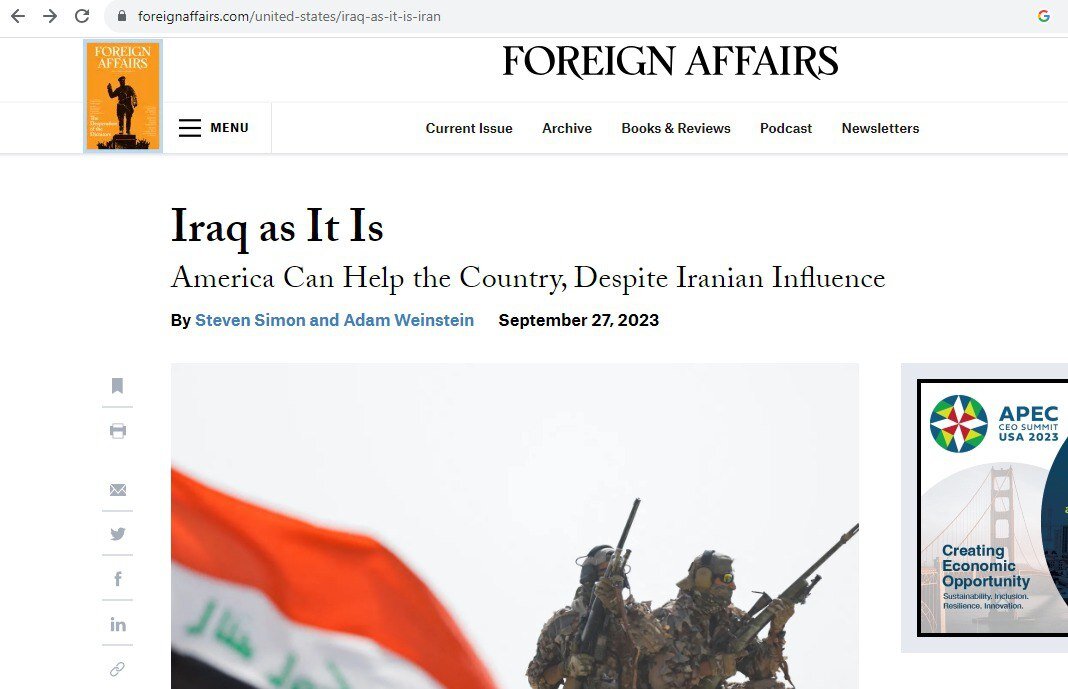What is the U.S. dreaming for Iraq?

TEHRAN - On September 27, Foreign Affairs ran a story about Iraq titled “America Can Help the Country, Despite Iranian Influence.”
The article, written by Steven Simon and Adam Weinstein, started with “What kind of relationship should the United States seek with Iraq?” and claimed “Iraq was a sanctioned pariah state, an enemy purportedly hell-bent on using weapons of mass destruction; after the 2003 U.S. invasion that toppled Saddam’s regime, Iraq, in turn, became an experiment in nation building, a half-hearted partner in the war against terrorism, and a marionette controlled by Iran. Now, the administration of U.S. President Joe Biden has assigned itself the task of moving beyond this shifting legacy and normalizing the relationship once and for all.”
Iraq was invaded by the U.S. and Britain in March 2003. Other U.S. allies joined American forces in later years. The invasion left half a million Iraqi people killed and the infrastructures destroyed. Iraq, a susceptible playground for extremist forces, experienced the tragic emergence of ISIS. The Western officials who led the invasion were neither shameful nor put on trial.
In fact, considering the destructive effect of the invasion, the U.S. should apologize to the Iraqi people and compensate for the destruction it left in Iraq and the wider region; however, the United States has always pursued its interests in Iraq, and after backing extremist groups and ISIS, it is now seeking to eliminate the main cause of its defeat in Iraq, namely the Iraqi resistance groups.
“One factor complicating progress in U.S.-Iraqi relations is the proliferation of militias that report to the prime minister but operate outside the formal command structure of the Iraqi military and, in some cases, appear guided by Iran,” stated the article.
The writers pointed to Washinton’s temptation on the elimination of the militias as a “mistake.” Yet the writers believe Iraq needs the ability to provide security for its citizens and rein in the militias on its own.
It seems that after a relatively long period of fruitless efforts to counter the resistance groups in Iraq, American policymakers are adopting a more realistic view of the role of the resistance groups in Iraq.
“The sensible approach for Washington is to strengthen the capacity of the Iraqi state through the slower, less coercive, and ultimately more sustainable levers of traditional diplomacy, targeted aid, and economic cooperation. The militias are here to stay, and challenging them directly would only increase their relevance and leverage—handing the Iranian government a win,” stated the article.
Elsewhere the article pointed to the leverage that the U.S. can exploit in Iraq and said, "Washington has leverage, too. It is the Iraqi security forces’ most important partner and the largest single provider of humanitarian assistance to the country."
The authors suggest the U.S. use “humanitarian aid” to help the Iraqi people to counter the militia. This is while the U.S. had played a major role in impoverishing the Iraqis.
Humanitarian aid is suggested as a way to help the nation and bring stability and security to the country. Yet the U.S. had played a major role in the emergence of extremist militant groups such as Daesh and the ensuing insecurity in the country.
As it was stated at the beginning of the article, in case the American and Iraqi officials have begun talks on a long-term defense partnership, these talks and a possible agreement could risk a resurgence of extremist forces - which have many overt and covert ties to the United States.
The Iraqi officials should remember that even if they receive something from the U.S., they will pay it back many times over.
Meanwhile, the U.S. concerned with the growing power of China and the crisis of the Russia-Ukraine war, is barely concerned with defending the Iraqi people against their enemy and will simply turn Iraq into a geopolitical battleground.
